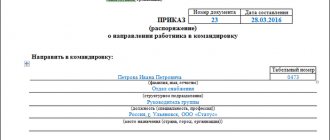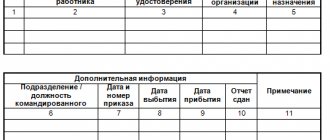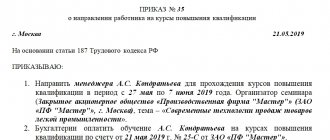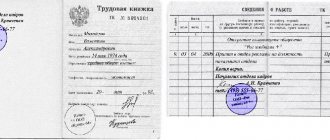Business trips in 2020: we arrange and pay for them
In accordance with Article 166 of the Labor Code of the Russian Federation, a business trip is a trip by an employee on behalf of the employer for a certain period of time to carry out an official assignment outside the place of permanent work. According to the norms of Article 167 of the Labor Code of the Russian Federation and Article 168 of the Labor Code of the Russian Federation, each employee is guaranteed preservation of his place of work (position), average earnings and reimbursement of expenses:
- on the way;
- for rental housing;
- additional expenses associated with living outside your permanent place of residence (per diem);
- other expenses incurred by the employee with the permission or knowledge of the employer.
How to arrange a business trip for an employee in 2020 and what forms to use for this?
A number of conditions under which a trip is a business trip
The above definition implies the following conditions, subject to which a particular trip can be considered a business trip:
- an employee of the enterprise is sent on a trip. That is, an individual must be in an employment relationship and work under an employment contract;
- the employee’s trip must take place to another locality, and not to the place of permanent work;
- the trip is carried out by order of the head of the enterprise for
- carrying out official assignments;
- the assignment is carried out outside the employee’s place of permanent work;
- the trip is limited to a certain period;
- the employee does not perform his work on the road and his work is not of a traveling nature.
In addition, business trips are also considered trips by employees on the orders of the head of the parent enterprise to a branch (from one branch to another) or vice versa (provided that the branches of the enterprise or the parent company and the branch are located in different localities).
https://www.youtube.com/watch?v=ytadvertiseru
The following cannot be considered a business trip:
- travel of employees whose work activities are constantly on the move;
- travel of employees whose work activities are traveling. That is, business trips are not periodic trips of employees related to their main work, but of a traveling nature;
- travel of employees whose work activity at the enterprise is not covered by an employment contract.
An employee on a business trip is subject to the working hours of the enterprise to which he is sent.
A business trip assumes that the employee will be away from home for some time. Therefore, you can often encounter the fact that employees do not want to go on such trips, and for various reasons they try to refuse them.
The law establishes specific situations in the event of which an employee may actually refuse to travel. But this list is closed.
In particular, this includes cases when the employee has not yet turned 18 years old, if a pregnant employee is sent on a business trip, if the employee has responsibilities due to which he cannot leave the city (for example, he is caring for and supervising a disabled person, he is a single parent, etc.), if the employee has a disability, etc.
All of the above categories of employees must provide written consent to a business trip. Without it, the administration has no right to send them on a business trip.
An ordinary employee can also give compelling reasons for not going on a work trip. But the final decision is still made by the head of the company.
Attention! Based on this, can they send an employee on a business trip without the consent of the employee - yes, but if he is not included in the preferential categories established by law.
The following categories of workers can go on business trips, but only if they give written consent to this step.
This includes the following groups:
- Mothers who have small children under 3 years of age;
- Single parents (regardless of mother or father), if he is raising a child under 5 years of age;
- If the employee is the parent of a child with a disability;
- Workers who care for a sick relative.
If the employer provides such an employee with a ready-made business trip consent form, it must include information that he has the right to refuse the trip. If an employee does not give his consent to a business trip, then sending him on the trip is strictly prohibited.
Attention! These rules are also established in the case when it is necessary to extend the trip at the initiative of the employer.
Another case when consent must be obtained from an employee is the need to work on a business trip on a weekend or holiday.
It is important to remember that an employee must have well-founded, valid reasons for refusing an upcoming business trip, unless, of course, the employee belongs to the category of individuals whom the administration cannot send on a business trip without consent.
An employee may be subject to disciplinary liability in accordance with Articles 192 and 193 of the Labor Code of the Russian Federation.
At the same time, when assigning a punishment to an employee, the company administration must take into account what consequences for the company arose as a result of the employee’s refusal to go on a trip.
Important! At the same time, the organization cannot immediately dismiss for this offense. This measure can only be applied if the employee has an outstanding debt.
Registration of a business trip in 2018: documents
The preparation of travel documents in 2020 follows from the norms of the Labor Code of the Russian Federation. Therefore, when sending an employee on a business trip, the employer is obliged to issue an order (instruction) that defines the purpose of the trip and the job assignment.
At the same time, starting from January 8, 2020, in accordance with the Decree of the Government of the Russian Federation of October 13, 2008 No. 749 “On the peculiarities of sending employees on business trips” (hereinafter Resolution No. 749), the organization does not need to separately fill out the official assignment and travel certificate. Now, to document expenses, it is enough to indicate in the order the purpose of the business trip and confirm the actual stay at the destination with round-trip travel documents. However, for convenience, in organizations where there are several departments and a seconded employee must solve several diverse problems, drawing up a job assignment will not be superfluous, especially since this is not prohibited by law. Therefore, if it is convenient to use the previous method of arranging a trip, you can not abandon it and simply indicate in the order all the documents that were used to prepare the trip.
The requirements for primary accounting documents are determined by Federal Law No. 402-FZ dated 6.1.2 2011 “On Accounting”. Therefore, the preparation of travel documents in 2020 must meet the following standards:
- The forms of primary documents are approved by the head of the organization. The company has the right to use unified forms of primary accounting documents approved by Decree of the State Statistics Committee of Russia dated January 5, 2004 No. 1, or develop them independently. Regardless of whether the organization uses unified accounting documents for processing travel expenses or those developed independently, its decision must be consolidated in local regulatory documents approved by the head;
- travel documents must contain mandatory details of accounting registers. The list of mandatory details is established by Art. 10 of the above-mentioned Federal Law on Accounting Law, which include:
- register name;
- name of the economic entity that compiled the document;
- the start and end date of maintaining the register and (or) the period for which the register was compiled;
- chronological and (or) systematic grouping of accounting objects;
- the monetary measurement of accounting objects indicating the unit of measurement;
- names of positions of persons responsible for maintaining the register;
- signatures of the persons responsible for maintaining the register, indicating their surnames and initials or other details necessary to identify these persons.
So, we have dealt with the forms of primary accounting documents and know how to properly arrange a business trip in 2020. After this, upon the employee’s return, it is imperative to correctly document the results of the business trip.
Can any business trip be considered a business trip?
Not every business trip can be recognized as a business trip
The foundations of state regulation in the field of business trips are laid by the Labor Code - Art. Art. 166–168 contain the main features of a business trip, guarantee the employee the preservation of basic labor benefits, and regulate the main points of payment of expenses. In addition, the rules limiting the circle of persons in respect of whom secondment may be “forced” or even possible are contained in a separate section of the Labor Code - the twelfth (Articles 259, 268). The secondment procedure is described in more detail in Government Decree 749 of October 13, 2008.
So, a business trip is a business trip for an employee. However, not every business trip can be called this term. For example, it would be absolutely contrary to common sense to send an intercity bus driver on a daily business trip, whose work initially involves “cruising” between several populated areas. In the same way, it makes no sense to send an employee to a neighboring street to resolve official issues in another organization. And it would be completely illegal to send an employee to another city during working hours to carry out personal assignments for the manager.
Nevertheless, the law provides absolutely clear criteria for determining a business trip:
- The seconded person must have an employment relationship with the employer (for those working under a civil law agreement, the concept of “business trip” does not exist).
- Departure is carried out by order of the employer (as a general rule - without taking into account the opinion of the employee).
- The purpose of the trip is to perform some official task.
- The departure takes place outside the locality in which the business traveler’s place of work is located.
Place of work
The key concept for business trips is the place of work
A point that raises many questions in the practice of business trips is the determination of the place of work of the business traveler. At first glance, everything is simple - the place of work is easy to establish, literally reducing it to the building of the organization where the workplace is located. Difficulties often arise when an employee:
- permanently works in a branch, and not in the parent organization - in this case, the place of work is the branch, but this condition must be reflected in the employment agreement with the employee (clause 3 of Resolution 749) - the trip is a business trip;
- works in the parent company, and is sent to a branch; in other words, his trip should take place within the same organization, but in different localities. In this case, the territorial attribute is decisive, and the trip will be considered a business trip;
- lives and sets off on a trip from a location other than the one where the permanent place of work is located - in this case, the business trip is still issued, but travel and daily allowances are not paid as a general rule (otherwise can be established by agreement with the management).
Example 1. An LLC employee, citizen Barankin, is registered and lives in the locality N, and works in the locality D, where the LLC branch is located. The company's head office is located in N. The employment agreement with Barankin states that his permanent place of work is a branch. The branch management decided to send Barankin to the head office of the LLC (settlement N, where Barankin lives). The head of the branch must properly formalize Barankin’s business trip - issue an order and issue a certificate. In this case, Barankin’s transportation expenses will not be paid, since he will not be able to present travel documents for traveling from point D to point H and back, and daily allowances will not be paid in accordance with paragraph 11 of Resolution 749 (the employee can freely return home after a working day business trip).
An interesting point is the secondment of remote and home-based workers to the office of the employing company. If we interpret the law literally, their place of work, by definition, is outside the company. If such an employee lives in another locality, he must be sent on a business trip. The hiring company itself issues the certificate, and it also records the arrival and departure from the destination. Travel allowances for such employees are paid in the usual manner.
Traveling work
The traveling nature of the work does not involve business trips
This is interesting: How to develop a competent business plan for a goose farm?
Some categories of professions (drivers, sellers of mobile retail outlets, etc.) presuppose daily travel of the employee between populated areas. The basic working conditions of the above-mentioned professions already take into account those incentives and guarantees that are provided for by the rules on business trips (they may be given an appropriate salary supplement). On the other hand, in order to be sent on a trip due to the traveling nature of the work, there is no need to check whether the employee has any restrictions on business trips. The law directly indicates the inadmissibility of business trips for such workers, as well as for those who work on a rotational basis.
The provision regarding the traveling nature of the work is necessarily included in the employment agreement. The categories of enterprise employees who may be subject to such a regime are determined by the collective agreement, other legal regulations, and industry documents.
Expenses associated with travel and accommodation are compensated by the employer in accordance with Art. 168.1 of the Labor Code either on the basis of supporting documents, or by establishing a salary increase.
Payment of employee expenses
Upon the employee’s return, it is necessary to correctly document and pay the expenses incurred by him. At the same time, as noted above, expenses also include per diem, which must be paid for each day the employee is on a business trip. The procedure for determining the number of days of stay on company business, as well as the procedure for calculating and paying daily allowances, is determined by Resolution No. 749. The organization determines the amount of daily allowances independently, fixing it in its local regulatory documents. At the same time, in accordance with the norms of the Tax Code of the Russian Federation, for a business trip in Russia, daily allowances in the amount of over 700 rubles, and for a foreign business trip in the amount of over 2,500 rubles for each day on a business trip, are not included in expenses that reduce taxable profit.
The employee submits to the organization’s accounting department a report on the business trip with a list of expenses incurred and the calculation of daily allowances, and also confirms the expenses incurred with documents - travel tickets, receipts and agreements on payment for rental housing, and others. The main document, in accordance with Resolution No. 749, is the advance report, for which a unified form N AO-1 has been developed. The employee must provide an advance report within 3 days upon returning from a business trip. Otherwise, his expenses may not be reimbursed.
Sample order for sending on a business trip (prepared using the commercial version of Consultant Plus):
Sample of a completed advance report (prepared using the commercial version of Consultant Plus):
How much is the employee reimbursed?
It often happens that the purchase of tickets and booking a hotel room is handled directly by the company administration, which means that the employee does not receive money for this. And there are no questions with them. But if money for travel expenses is given to a person, then you need to understand what standards are used to reimburse them.
By law, travel expenses allow an employee to get to their destination, buy food, pay for accommodation, and afford other things previously agreed upon with the head of the company. And since the person went to perform an official assignment, he should be compensated for all expenses incurred and agreed upon with his superiors, and not consider the amount issued as income. That is, neither income tax nor insurance premiums are withheld from them. But this is provided that the company has approved a regulatory document (regulations on business trips), which provides for compensation standards, as well as the procedure for this procedure.
The only expense item that is standardized at the legislative level is the amount of daily allowance. In particular, the Tax Code of the Russian Federation states that daily allowances issued in the following amounts are not subject to personal income tax and insurance contributions:
- 700 rubles - per day of travel around the country;
- 2500 rubles - per day of a business trip abroad.
This does not mean that the employer cannot pay more. Maybe. But in this case, the company will have to withhold income tax and insurance premiums from the excess amount.
We also note that the subordinate is not required to report on what he spent the daily allowance on and whether he spent it at all. This is the item of travel expenses that is taken into account when taxing company profits without documents confirming that the money was spent.
Changes in legislation regarding business travel
Since 2014, the legislation in the context of business travel has undergone certain changes. The most significant reforms were implemented in 2020:
- The department on all settlement issues and the regulations for conducting operations for calculating daily allowances was transferred to the tax authorities from extra-budgetary funds;
- The calculation of insurance contributions began to be based on the amount of funds that exceeds the limit. It is understood that the manager of the organization has the right to independently set the amount of daily payments for business trips of employees. This amount may also exceed the norm established by the Tax Code of the Russian Federation. All amounts of travel payments must be reflected in local regulations or in a collective agreement;
- When calculating the basis for calculating daily allowances, insurance premiums for injuries are no longer taken into account.
Based on Art. 217 of the Tax Code of the Russian Federation, tax-free amounts are:
- Business trips within the Russian Federation – 700 rubles. per day;
- Business trips abroad – 2500 rubles. per day.
The employer can make adjustments to the amount of daily payments at any time in the reporting year. However, practice shows that most managers use the beginning of the year for such changes in order to facilitate the further work of the accounting and personnel departments.
Daily allowance abroad and in Russia: sizes
Since almost all travel expenses abroad and within the country can be taken into account when taxing company profits in full, we will dwell in more detail only on daily allowances, for which a personal income tax-free limit has been introduced.
About 5 years ago, the government required employers to provide employees with travel expenses that were no less than specified minimum amounts. But then they abandoned this, maintaining the standards only for state delegations. According to Government Decree No. 729 dated October 2, 2002, each federal civil servant is entitled to no more than 100 rubles per day if he goes on a business trip around the country. If you have to perform duties outside the Russian Federation, then the daily allowance is 50-70 dollars, depending on the specific country (Appendix No. 1 to Government Resolution No. 812 of December 26, 2005). Please note that these standards are not mandatory for employees of regional government agencies, local governments, and municipal institutions. For them, allowable travel expenses are determined locally.
As for private enterprises, the managers of such companies themselves decide what the daily allowance should be. But the majority tries to comply with the norms that are not subject to personal income tax and insurance contributions: no more than 700 rubles per day when traveling within Russia and up to 2,500 rubles outside its borders. Let us repeat: no one forbids giving more, it’s just that you will have to pay tax (Article 217 of the Tax Code of the Russian Federation) and insurance premiums (Article 422 of the Tax Code of the Russian Federation) on the excess amount. Please also note that for persons occupying different positions and specialties, different daily allowance rates may be established. But this must be stated in the organization’s regulatory document.
Please note that daily allowances are paid for each day of a business trip, for days en route and for periods of forced downtime. However, they do not replace wages; the employer is obliged to pay the average wage while the employee works in another locality.
Categories of employees who cannot be sent on a business trip
The employer has the right to arrange a business trip for a subordinate who constantly works in the company in one position. However, this rule does not apply to workers associated with transport activities (for example, truck drivers or couriers), as well as entities working under a civil agreement.
In order for a business trip to be sent legally, the employer needs to make sure that the subordinate does not belong to the category of employees who are prohibited from going on business trips. In addition, there are also groups for whom going on a business trip is legal only with their written consent.
Thus, the first category of employees who are prohibited from going on business trips include:
- women expecting a child;
- employees carrying out work activities in parallel with training;
- workers who have not yet reached 18 years of age. The exceptions are creative workers, as well as athletes;
- subjects employed by the company on the basis of a civil law agreement.
The second category of employees, whose assignment on a business trip is possible only with their written consent, includes:
- mothers of children under 3 years of age;
- single parents whose children are under 5 years old;
- parents, guardians and adoptive parents of disabled minors;
- subjects who care for relatives based on a medical prescription.
Results
Since 2020, the standards for processing documentation related to sending employees on business trips have become more flexible and have reduced the amount of paperwork for the enterprise’s personnel department.
However, a company’s expenses are not only cash costs, but also an item that reduces the tax base for calculating income tax, which is under the close attention of the Federal Tax Service. That is why the employer fights for every penny, sometimes becoming conservative: for example, using the previous rules for processing documents related to sending on a business trip. The main condition for this is the consolidation of all controversial issues in an internal regulatory document - the accounting policy of the enterprise. This will make it much easier for the tax authorities to prove that you are right regarding business trip expenses. You can find more complete information on the topic in ConsultantPlus. Full and free access to the system for 2 days.
Documentation of a business trip within the state
Registration of a business trip means not only the process of drawing up papers for sending an employee on a business trip, but also the subsequent collection of documents upon the employee’s arrival back.
The package of documents is drawn up in the human resources department or, in its absence, by the head of the company or a private entrepreneur.
So, first of all, you need to prepare an order. It is drawn up according to the regulated form No. T9, and contains the following positions:
- passport information about the employee;
- serial number of the subject in the report card;
- position held by the employee;
- department (unit, department, workshop) in which the employee works;
- the main goals of the business trip, the employee’s tasks that must be achieved during business events. In addition, the timing of the trip and sources of financing are also determined (financial funds are issued in advance against a report, or an option is selected in which the employee is subsequently reimbursed for expenses);
- place (name of locality) where the subordinate will live during the business trip.
Until 2020, the requirement to obtain a travel certificate and official assignment remained. At the moment, these papers are irrelevant. However, the enterprise can continue to use them if the corresponding provision is fixed in local regulations.
Practice shows that most organizations continue to use a travel certificate, since this document is extremely informative.
Also, the documents required to complete the business trip include an advance report. This report is drawn up according to the regulated form AO-1, and requires additions in the form of supporting documents upon the arrival of the subject.
How to properly refuse
In normal situations, an employee is not given the right to refuse a business trip. Labor legislation establishes that it is part of his official duties.
If an employee refuses to go on a business trip, the administration has the right to regard this step as a refusal to perform duties and hold the employee accountable, up to and including dismissal under the article.
Therefore, can an employee refuse a business trip? No. If it is not included in the number of preferential categories for which a ban is established or consent is required, then you cannot refuse the trip.
An employee may have valid reasons with which he can appeal to his management. Let's consider whether it is possible to refuse a business trip because of them.
The reason why an employee cannot go on a trip may be due to family circumstances.
We invite you to read: Reduction of position and assignment of duties to another employee
For example, this could be the birth of a child, the death of a relative, marriage, etc. He has the right to take leave without pay for this period, and the employer will have to provide it.
You can ask your employer to cancel a trip if the employee’s anniversary falls during the trip.
Important! However, this reason is not specified in the regulations, and therefore this step is entirely at the discretion of the employer.
The presence of a small child in a family is not a valid reason for refusing a trip, even if the family has many children.
However, at the same time, an employee may fall into one of the preferential categories:
- He is a single parent and the child is no more than 5 years old;
- He is caring for a disabled child;
- He is the guardian of a minor child;
- He takes care of a sick relative (in this case, a child).
Attention! If these factors exist, the employee must be notified of the work trip in advance and consent must be obtained.
If an employee's spouse is pregnant, this may be a reason to refuse the trip, but it is not officially provided for by law. Therefore, the decision remains at the discretion of the boss.
However, you can get a certificate from a medical institution that she requires constant care, and this is provided by her husband. Then you can refuse the trip for legal reasons.
If an employee refuses a trip unreasonably, this will be a disciplinary offense, which may result in punishment - a reprimand, reprimand, or in extreme cases, dismissal.
The choice of punishment will depend on how severe the damage was caused to the enterprise due to the employee’s refusal.
When imposing punishment, the following indicators must be taken into account:
- The employee must provide evidence of the validity of the refusal, or the commission issues an act of refusal to provide explanations;
- Cancellation of a business trip must be made in writing;
- The punishment must be established within 1 month from the date of refusal;
- The employee must be presented with the order imposing punishment against signature.
Important! Dismissal can be made only when the employee has previously violated labor discipline more than once. And this is not an easy task, and such a solution should be resorted to only as a last resort.
To refuse a trip, the employee must fill out an application addressed to the manager according to the provided sample.
The text of the document describes the reason why the employee cannot take part in the business trip. If he is one of the persons from whom it is necessary to obtain consent for the trip, this is directly indicated in the application and supporting documents are attached.
If the employee does not have the right to refuse according to the law, then it is necessary to talk with the manager and convince him to cancel the trip.
The documents that need to be provided depend on the reason for refusal, this may include:
- Sick leave;
- Certificate of illness of a close relative of the employee;
- Adoption document;
- Certificate of disability of a relative;
- Subpoena;
- Other documents that can be used to confirm the refusal.
An employee has the opportunity to refuse a business trip if the company’s management made a mistake when arranging the business trip.
Such circumstances may include:
- Not all documents have been completed for the upcoming business trip.
- The employee has not received all compensation for travel expenses provided for by law.
- The task assigned to the employee for the upcoming trip does not correspond to the job functions he performs.
There are other unofficial ways that allow an employee to refuse a trip. For example, marriage (fictitious). But then the employee will have to deal with the divorce.
Important! It is still recommended to find legal ways to avoid the upcoming trip.
Step-by-step instructions for registering for a business trip in Russia
Step-by-step instructions for registering a business trip are as follows:
- Specific tasks and goals of the trip are highlighted. The location of the subject and the period of his business trip are also determined.
- Publication of the employer’s order in the regulated T9 form or in any other form officially recorded by a local regulatory document.
- When an employee goes on a business trip, this day is noted in the log book. Information about the employee himself, the organization for which the business trip was assigned, as well as the destination are entered there. In the case where it is customary for an enterprise to use the approved form of a logbook for employees sent on a business trip, a dash is required in the column about the certificate.
- The entire period while the employee is absent from his workplace, it is required to continue to maintain a time sheet. In those columns that require days of absence, the letter “K” should be entered, which means the subject is on a business trip. In addition, if an employee’s business trip falls on his day off, this is also entered into the timesheet, and Fr.
- An advance report is drawn up according to the unified form AO-1. This is necessary to attach supporting documents and circumstances proving the validity of the expenses made, as well as to provide reporting to the head of the company.
- Upon the return of the subordinate, the advance report is submitted to him for immediate completion, entering information and attaching supporting documents. This report must be completed within the first three days from the date of return. If the employee’s return day falls on a weekend or holiday, then the advance report should be submitted within three days from the first working day after the end of the weekend or holiday.
- The employee checks all supporting documents submitted to him (checks, receipts, travel tickets, air tickets orders, etc.).
- The advance report, together with all documents, is submitted to the company’s economic security service or to the accounting department, if there is none. After checking the authenticity of the package of documents, as well as recording the fact that such a report was submitted on time, the papers are transferred to the manager. At this stage, the manager can also additionally recognize other expenses submitted by subordinates. If other expenses are confirmed by the employer, the employee has the right to count on additional compensation payments.
The procedure for registering a business trip also involves drawing up the necessary documents after the employee returns from a business trip. In addition to the expense report and accounting journal, it is necessary to draw up a memo. This paper must be drawn up if the subordinate used his own transport or transport by proxy during a business trip. The document can be drawn up in free form, but all required details must be taken into account. A sample of such a note should be available from the personnel department.
So, if personal transport was used, then you need to indicate its make and registration number. Also, all receipts confirming fuel expenses must be added to the applications.
If during the trip transport was used under a power of attorney, information about the trust document (number and date) must be included in the note.
In addition, many enterprises still use a travel certificate and an official assignment. Their completion should be based on unified forms, which should also be kept in the personnel department. There, the employee can receive sample papers to fill out later.
Section 2. Categories of workers who are sent on business trips
Labor legislation for certain categories of employees establishes the opportunity to refuse a business trip.
Who should not be sent on business trips without their consent:
- Pregnant woman;
- An employee who has not yet reached the age of majority. However, this rule does not apply if the employee is engaged in creative professions, works in the media, etc.;
- An employee with a disability who is currently undergoing rehabilitation and has been determined that deployment will be detrimental to health;
- The employee performs duties on the basis of a student agreement, and the trip is in no way connected with it;
- A company employee is a candidate (this prohibition is established only for the period of elections).
Attention! For foreign citizens who reside temporarily on Russian territory, the period of business travel may be limited by law.
2.1. Employees who have an employment relationship with _____________________ are sent on business trips.
All employees can be sent on business trips, with the exception of those whose sending on business trips is prohibited by law and these regulations (Section 3).
2.2. Sending the following categories of employees on business trips is permitted only with their written consent and provided that this is not prohibited to them in accordance with a medical certificate issued in the manner established by federal laws and other regulatory legal acts of the Russian Federation:
- women with children under three years of age,
- mothers and fathers raising children under the age of five without a spouse,
- workers with disabled children,
- workers caring for sick members of their families in accordance with a medical report,
- disabled workers.
At the same time, such employees must be informed in writing of their right to refuse to be sent on a business trip.
3.1. The following employees cannot be sent on business trips:
- pregnant women;
- minor workers;
- employees for whom business travel is contraindicated for health reasons;
- employees who have entered into an apprenticeship agreement with the employer (during the period of validity of the apprenticeship agreement, these employees cannot be sent on business trips not related to the apprenticeship);
- employees specified in clause 2.2 of this regulation, if they refused to go on a business trip.
- _____________________.
We suggest you read: Privatization of an apartment in marriage. How to divide it then?
4.1.The duration of the business trip is determined by the employer, taking into account the volume, complexity and other features of the official assignment.
https://www.youtube.com/watch?v=ytpressru
4.2. The employer has the right to extend the period of business trip for a period of _________________, if this does not contradict the law, the terms of the employment contract with the employee, or the employer’s local regulations. Extension of the period of business trip of employees specified in clause 2.3 of this regulation is allowed only with their written consent and provided that this is not prohibited to them in accordance with a medical certificate issued in the manner established by federal laws and other regulatory legal acts of the Russian Federation.
4.3. The day of departure on a business trip is the date of departure of a train, plane, bus or other vehicle from the place of permanent work of the business traveler, and the day of arrival from a business trip is the date of arrival of the specified vehicle at the place of permanent work. When a vehicle is sent before 24 hours inclusive, the day of departure for a business trip is considered the current day, and from 00 hours and later - the next day.
If a station, pier or airport is located outside a populated area, the time required to travel to the station, pier or airport is taken into account.
The day the employee arrives at his place of permanent work is determined similarly.
4.4. The issue of an employee’s attendance at work on the day of departure on a business trip and on the day of arrival from a business trip is resolved by agreement with the employer. If an employee does not agree to go to work on the day of departure on a business trip or on the day of arrival from a business trip (for example, because he needs rest or for other reasons), then he has the right not to go to work on these days. In this case, the employer does not have the right to bring him to disciplinary liability.
4.5. The employee is obliged to begin fulfilling his work duties stipulated by the employment contract on his next working day after the day of his return from a business trip, based on the work schedule established for this employee.
4.6. In the event that an employee returns from a business trip within a period not agreed upon by the parties, he provides the employer with a supporting document (certificate, etc.). If such a document is not submitted by the employee, this period is not included in the period of the business trip and for this period the payments provided for in Section 5 of these Regulations are not made.
4.7. When traveling on business to an area from where the employee, based on transport conditions and the nature of the work performed on the business trip, has the opportunity to return daily to his place of permanent residence, daily allowances are not paid. The question of the advisability of the daily return of an employee from a business trip to a place of permanent residence in each specific case is decided by the head of the organization, taking into account the distance, transport conditions, the nature of the task being performed, as well as the need to create conditions for the employee to rest.
4.8. The actual period of stay at the place of assignment is determined by the marks on the date of arrival at the place of assignment and the date of departure from it, which are made on the travel certificate and certified by the signature of an authorized official and the seal that is used in the economic activities of the organization to which the employee is posted to certify such signatures.
4.9. To register and record the assignment of employee(s) on a business trip(s), the following documents are used.
4.9.1. An official assignment for sending on a business trip and a report on its implementation (form T-10a), approved by Resolution of the State Statistics Committee of the Russian Federation of January 5, 2004 No. 1 “On approval of unified forms of primary accounting documentation for recording labor and its payment.” Form T-10a is used to prepare and record a work assignment for sending on a business trip, as well as a report on its implementation.
The official assignment is signed by the head of the structural unit in which the posted employee works. It is approved by the head of the organization or a person authorized by him and submitted to the personnel service for issuing an order (instruction) on sending on a business trip (Form N T-9 or N T-9a).
4.9.2. Travel certificate form N T-10, approved by Resolution of the State Statistics Committee of the Russian Federation dated January 5, 2004 N 1 “On approval of unified forms of primary accounting documentation for recording labor and its payment.” Based on the employer’s decision, the employee is issued a travel certificate confirming the duration of his stay on the business trip (date of arrival at the destination point(s) and date of departure from it(es)).
4.9.3. Order (instruction) on sending an employee on a business trip (form N T-9) and Order (instruction) on sending workers on a business trip (form N T-9a), approved by Resolution of the State Statistics Committee of the Russian Federation dated January 5, 2004 N 1 “On approval of unified forms of primary accounting documentation for labor accounting and payment."
Orders in forms N T-9 and N T-9a are filled out by a personnel service employee on the basis of an official assignment, signed by the head of the organization or a person authorized by him to do so. The order for sending on a business trip indicates the last name(s) and initials, structural unit, position (specialty, profession) of the traveler(s), as well as the purpose, time and place(s) of the business trip.
4.9.4. A register of employees leaving on business trips from the sending organization, approved by Order of the Ministry of Health and Social Development of Russia dated September 11, 2009 N 739n.
https://www.youtube.com/watch?v=upload
4.10. To register and record employees arriving on a business trip to ______________, the Register of employees arriving at the organization to which they are sent, approved by Order of the Ministry of Health and Social Development of Russia dated September 11, 2009 N 739n, is used.
4.11. In order to organize the work of maintaining a logbook for employees leaving on business trips from the sending organization, for maintaining a logbook for employees who arrived at the organization to which they are sent, for making notes on travel certificates, the manager, by order, appoints a responsible person who maintains the listed approved forms in the manner prescribed by law.
Are you planning to start your own business? With the help of the Angard law firm, registering an LLC in Ulyanovsk will take a minimum of time and require minimal client participation. Our lawyers accompany the LLC registration procedure at all stages.
Procedure if an employee has not completed a travel assignment
Situations often arise in which an employee does not achieve the goal set for him, and returns from a business trip with the same result as before the trip. Therefore, many employers are wondering whether it is necessary to take into account such expenses for business travel if there was no result. Accountants often take the loyal side, arguing that such expenses are taken into account if there is documentary evidence of them. However, tax officials have the opposite opinion, believing that an unproductive business trip should not be taken into account.
One of the most common formulations of the purpose of the trip is: “Signing an agreement with the customer.” It is impossible to predict the outcome of the trip in advance, although the employee spends certain amounts on this action. Tax workers are opposed to recognizing the costs of fruitless business trips due to the lack of grounds for reducing income taxes.
On this issue, misunderstandings and conflicts often arise between company representatives and tax employees. Thus, managers and chief accountants can file a claim asking that specific expenses be recognized as legitimate, since the employee was sent on a business trip for production purposes, regardless of the result obtained. Practice shows that in most cases the judge grants such claims.
Business trip expenses: what the employer pays for
When sending an employee to perform work functions in another locality in Russia, at the company’s expense it is necessary:
- purchase travel tickets, regardless of the type of transport. The only exception is a taxi - a trip in it, as a rule, is not compensated;
- pay for housing - this could be a hotel room or rental housing, provided that there are documents proving the corresponding expenses;
- issue daily allowances - they are calculated for each day of a business trip, including each day when the employee was on the way to another location and back. The exception is for one-day trips - if in the morning the employee went to another locality to fulfill the received official assignment, and returned in the evening (before 12 o'clock at night). No daily allowance is paid for them;
- other expenses, as agreed with management. For example, an organization’s internal documents may provide for compensation for entertainment expenses, costs for renting a car and/or a personal driver, for the services of VIP lounges at airports, communication services, and other issues.
As for trips abroad, the employer is also responsible for paying consular fees, issuing money for a visa, paying for insurance, and paying other mandatory payments when crossing the border.
In addition, the employer is obliged to maintain the posted employee’s salary, since in fact the person performs his work duties outside the organization. In this case, the salary is paid for each day of the business trip, including the days when the employee was on the road.
According to the general rules, if documents confirming expenses during a trip are presented, then they can be fully taken into account when calculating income tax or tax on the simplified tax system.
Registration of foreign business trips
When traveling abroad on business, the manager first needs to find out whether the host party bears any part of the costs. Often, foreign opponents can reimburse housing costs.
In addition, you should find out whether the subordinate has a foreign passport and the appropriate visa.
Registration of a foreign business trip after the publication of an order to send an employee on a trip goes through the following stages:
- Obtaining a visa and foreign passport if necessary. Moreover, such expenses, as practice shows, are compensated by the employer, classifying them as additional expenses.
- Registration in the name of the subject of housing (hotel rooms or rented living space).
- Formation of a package of documents necessary to achieve the purpose of the trip.
- Calculation of the amount of advance payment and daily allowance, as well as the subordinate’s earnings for all days of the trip.
- Payment of taxes to the necessary authorities (personal income tax and extra-budgetary entities).
Innovations in 2020 eliminated the limitation of subjects’ stay on business trips. Thus, the duration of the trip abroad should be indicated in the relevant order.
How to properly refuse
The following events in the life of an employee can also be considered valid reasons:
- An emergency situation that affected the employee or his family;
- The need to urgently obtain some document;
- An important event for the family.
However, in order to win over the manager, in each situation it is advisable to provide a supporting document.
An employee may refuse to go on a business trip when he needs to undergo treatment, or a long trip is contraindicated for medical reasons.
In such a situation, the employee needs to prepare an application and attach a supporting document to it - a doctor’s certificate, sick leave, etc.
Before leaving on a business trip, the employer must provide the employee with funds from which he will pay for travel, accommodation, food, etc.
An approximate calculation of the required amount is carried out by an accountant. If the employee is given insufficient funds to cover all expenses, and he can prove this fact, then he has the right to refuse the business trip, since he is not obliged to finance it from his own funds.
Attention! However, the lack of funds must be carefully justified and proven.
The employer is obliged to pay the employee money to finance business trip expenses.
If this is not done, then the employee has the right not to go on a work trip, since he is not obliged to finance it from his own funds. The employer does not have the right to impose disciplinary punishment on him in such a situation.
Nuances of travel arrangements
Some of the nuances of business trips include:
- Arranging a business trip for a group of employees at the same time. That is, several people must go on a business trip under one order. To do this, you need to use the regulated form T9a (order), in which all sent subordinates will be listed.
- Registration of a business trip if it lasted several hours. A business trip is a trip to another area other than the territory where a citizen usually works. So, if the trip lasts only a few hours, but takes place in another city, it must be issued in accordance with the standard rules for registering such events. However, in this case, the employee will not be entitled to daily payments and reimbursement of living expenses.
Thus, the question of how to arrange a business trip in 2018 is not always easy to resolve. The head of the company needs to be well informed regarding the legislation in this area, as well as familiarize himself with the step-by-step instructions for such an action given in the article.
Arranging for a business trip in 2020: step-by-step instructions
Duration of business trip
The duration of a business trip is determined by the employer himself and depends on the complexity and volume of the task being performed, as well as other circumstances on which the execution of the assignment may depend. That is, the deadline for the trip is not set.
https://www.youtube.com/watch?v=ytaboutru
The day of departure on a business trip is the date of departure of a train, plane, bus or other vehicle from the place of permanent work of the business traveler, and the day of arrival from a business trip is the date of arrival of the specified vehicle at the place of permanent work.
Returning from a business trip
How to prepare documents upon returning from a business trip?
First of all, upon returning from a trip, the employee must prepare and submit an advance report. 3 days are given for this . At the same time, the excess of the advance payment must be returned to the employer: in cash at the cash desk or deduction from wages is acceptable at the request of the employee.
For a business trip abroad, the paperwork is similar .
If was not enough , the employer is obliged to reimburse the expenses incurred on the basis of supporting documents - tickets, hotel bills, sales receipts for purchased materials, etc.
If the employee does not return the balance of the unused advance, the employer has the right to withhold this amount from the salary in accordance with paragraph. 3 hours 2 tbsp. 137 Labor Code of the Russian Federation. However, this can only be done if the employee does not dispute the amount.
Therefore, it is necessary to obtain consent to deduct from his salary. A similar position is set out in the letter of Rostrud dated October 7, 2019 No. PG/25778-6-1. If the employee does not agree with the amount of deduction, then it can only be recovered through the court.










